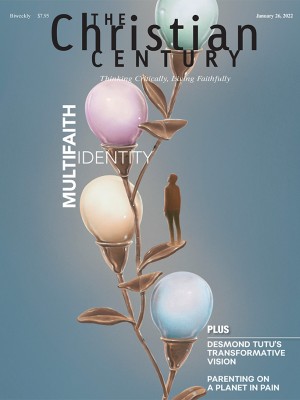Undertakers, rabbis join global fight promoting COVID shots

A year after the COVID-19 vaccine became available, traditional public health campaigns promoting vaccination are often going unheeded. So an unconventional cadre of people has joined the effort.
In Germany, Lutheran pastors are offering COVID-19 shots inside churches. In Israel’s science-skeptical haredi community, trusted rabbis are trying to change minds. And in South Africa, undertakers are taking to the streets to spread the word.
The funeral directors’ message: “We’re burying too many people.”
As the outbreak drags on into a third year, with the global death toll at 5.4 million, vaccine promoters are up against fear, mistrust, complacency, inconvenience, and people who simply have bigger worries than COVID-19.
On a December day, a convoy of hearses with sirens wailing drove up to a shopping mall in Johannesburg’s sprawling Soweto township.
“Vaccinate, vaccinate!” Vuyo Mabindisi of Vuyo’s Funeral Services said as he handed out pamphlets on how to avoid COVID-19. “We don’t want to see you coming to our offices.”
German pastor Christoph Herbst believes giving COVID-19 shots in surroundings that feel more familiar than medical settings may help. That’s why he and several other Lutheran pastors in the Saxony region contacted an aid group to offer shots inside their churches, despite sometimes violent anti-vaccination protests. Some pastors have been criticized and even threatened.
Read our latest issue or browse back issues.
“We believe that we have a responsibility that goes beyond ourselves,” said Herbst, who pastors St. Petri Church in the eastern city of Chemnitz. “We’re not doctors and we’re not professionals. But we have the space, and we have volunteers who can organize something like this.”
Saxony has Germany’s lowest vaccination rate and high COVID-19 numbers.
Herbst opened St. Petri’s wrought-iron doors on a recent vaccination day and sighed with relief when he saw the long line of people waiting in the cold.
Herbst said many naysayers are concerned about possible side effects, feel they are overly pressured by authorities, or resent any measures supported by the government. Some feel discriminated against as East Germans, because not all their hopes have been fulfilled 30 years after communism’s collapse.
“It’s important that there’s a space where we listen to each other without immediately lapsing into condemnation,” Herbst said.
Chicago community activist Caesar Thompson uses that same approach as he knocks on doors in Black neighborhoods hit hard by the virus.
Thompson, 44, is a “vaccine ambassador” enlisted by city health authorities. He said the idea is not to strong-arm or cajole. Instead, he said, he offers information, answers questions, and lets people know he can sign them up to receive shots in their homes or nearby.
Thompson has a salesman’s gift of gab, and he has used it at churches, train stations, parks, flea markets—almost anywhere people gather. Thompson said it helps that he’s “just a guy on the street.”
In communities he targets, the coronavirus is often not the most pressing concern, Thompson said. For people who lack jobs or health insurance and are struggling to feed their families, “COVID is down the list for them,” he said.
In conservative Wyoming, the vaccine can be a hard sell. Commissioners in Campbell County voted against using federal dollars for an education campaign about the vaccines, worrying that it would smack of a mandate. The county’s vaccination rate is about 27 percent.
Gabby Watson, 23, of Gillette, said she has no intention of getting vaccinated “because I’m really healthy and take care of myself. I’m just not a high risk for COVID. I just don’t see the reasoning for me to get the vaccine.”
She said the US government is pushing COVID-19 vaccines too hard.
“They’re pushing more people away and creating more of this thought bubble of, ‘What the hell are you trying to do with my body? What are you trying to do with my freedom?’” Watson said.
Suspicion of secular authorities is rampant in Israel’s haredi community. They follow a strict interpretation of Judaism, shun many trappings of modern life, and rely on rabbis to guide many life decisions. While some rabbis have encouraged vaccination, others have taken a less assertive approach.
The haredim have some of Israel’s lowest vaccination rates and have been hit hard by the pandemic.
While Israel’s vaccination rates for the second dose among the general population hover around 63 percent and the booster at 45 percent, in the haredi community the numbers are around half that.
Now, facing the omicron variant, Israeli officials “are going on the offensive,” said Avraham Rubinstein, the mayor of Bnei Brak, the country’s largest haredi city. They are deploying mobile vaccination clinics and enlisting prominent rabbis in the community.
The haredim—13 percent of Israel’s population—tend to live in crowded neighborhoods, with large families in small apartments, where sickness can spread quickly. Synagogues, the centerpiece of social life, bring men together in small spaces. Also, half of the population is under 16 and only recently became eligible for vaccination.
Gilad Malach, who heads the haredim program at a Jerusalem think tank, said there is a “double fear: fear of the state and fear of science. There is no basic trust in these entities.”
In India, complacency is contributing to a low rate of second shots among the population of 1.4 billion: 40 percent are fully vaccinated and around 19 percent have received just one shot.
In Uttar Pradesh, India’s most populated state, Rohit Kanojia received his first shot in August 2021 but didn’t get the second one.
“I forgot,” the 23-year-old said, adding that people are no longer afraid of COVID-19. People roam around without masks, and no one maintains social distance, he said. “Life is almost normal.” —Associated Press






